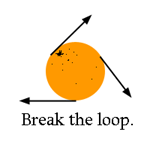

 | Tangentium |
January '04: Menu
All material on this site remains © the original authors: please see our submission guidelines for more information. If no author is shown material is © Drew Whitworth. For any reproduction beyond fair dealing, permission must be sought: e-mail drew@comp.leeds.ac.uk. ISSN number: 1746-4757 |
Feature Essay: Language Engineering and Public PolicyKevin CareyPage 1 ¦ Page 2 ¦ Page 3 ¦ Page 4 ¦ Printer-friendly version [EDITOR'S INTRODUCTION] In this feature essay, Kevin Carey discusses the ways in which IT can enhance the provision of information from public bodies. Computing technology, particularly the improvements it delivers in our ability to process and connect texts, opens up the possibility of implementing hypertext systems which may have genuine impacts on democracy and the freedom of information. Carey discusses why this is necessary, and the technological and social developments which will assist such a project. Kevin Carey is the Director of HumanITy, a charity, lobbying organisation and think tank working to draw attention to the problem of social exclusion caused by the increased use of information technology. This essay is an edited version of a speech made at the University of Sunderland. In the precise spirit of this paper, we have provided the original unedited source text (in Rich Text Format (*.rtf), 177 Kb in size). The concept of hypertext is so fundamental to the World Wide Web that it appears in two of its most ubiquitous acronyms:
Yet the WWW as it currently stands is an extremely limited application of true hypertext. Connections between documents are made at the whim of the author, and often do not serve to increase understanding. What I want to talk about here is a possible implementation of hypertext which may have genuine benefits for democracy and the freedom of information within our society. First, however, I wish to spend some time setting the scene within which these new technologies have emerged. Humans have always used technology to engineer the world around them. With information technology, our ability to do this now extends beyond the material world and into the realms of information and language. One of the reasons this has become necessary is the enormous increase in informational resources available to us. Up until the end of the 17th century it was perfectly possible for a figure such as John Milton, statesman and poet, to have read every book his culture thought significant. It is at this period, of Milton, Newton and Wren in England and of Descartes, Spinoza and Leibniz in Continental Europe that the first real signs of the impossibility of polymathy emerge. Why was this? The proliferation of texts and knowledge arose from a variety of factors:
These all had an effect on cultural attitudes to literary resources. The way of writing a text changed. St. Augustine was regarded in his day as prolific, but his speed of writing was such that his great work, The City of God, was not so much a treatise with a proposition, discussion and conclusion as it was an intellectual journey. He began with a set of assumptions which stayed relatively intact, but the conclusions he drew from them changed radically through time, particularly after the sack of Rome in 410 CE. There was no leisure for a second edition. By Shakespeare's time, when printing was some 200 years old, we see a man terribly careless with his manuscripts. Pirate copies of his plays circulated and within years of his death a number of editions of his work had been put together more or less professionally and honestly with an attempt to arrive at an authoritative text from a variety of sources. It became a subconscious trait in authors, editors and printers to work in the knowledge that any edition need not be the last word, intellectually or typographically. Our contemporary word processing and web publishing packages are simply the last word on provisionality, psychologically if not physically. You only have to look at the quantity of ephemeral and authoritative prose being generated by each of us as students, academics and intellectuals to know that only a very few of us will be able to maintain Augustan quality. We adjust to, acquire and lose information at an immense pace. We are the first generation not only to produce more intellectual resources in one decade than the whole of human history before it but also the first to have forgotten more than we know. This is the world of the constantly ephemeral, febrile and instant which forms the context for a public sector requirement for the applied resources of language engineering. We require this in order that those in the public policy sector, and politicians who formulate and implement public policy, can have a more effective dialogue with society. | |